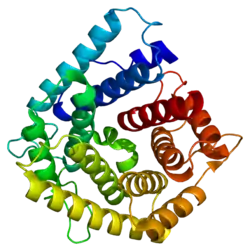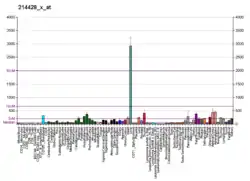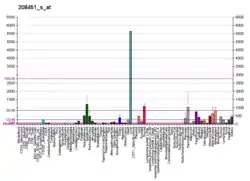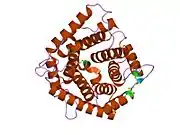C4A
Complement C4-A is a protein that in humans is encoded by the C4A gene.[5]
Function
This gene encodes the acidic form of complement factor 4, part of the classical activation pathway. The protein is expressed as a single chain precursor which is proteolytically cleaved into a trimer of alpha, beta, and gamma chains prior to secretion. The trimer provides a surface for interaction between the antigen-antibody complex and other complement components. The alpha chain may be cleaved to release C4 anaphylatoxin, a mediator of local inflammation. Deficiency of this protein is associated with systemic lupus erythematosus and type I diabetes mellitus.[6][7][8][9][10][11] Excess production is associated with schizophrenia and bipolar disorder with psychosis.[12] This gene localizes to the major histocompatibility complex (MHC) class III region on chromosome 6. Varying haplotypes of this gene cluster exist, such that individuals may have 1, 2, or 3 copies of this gene.[5]
References
- ENSG00000206340, ENSG00000244731, ENSG00000227746 GRCh38: Ensembl release 89: ENSG00000244207, ENSG00000206340, ENSG00000244731, ENSG00000227746 - Ensembl, May 2017
- GRCm38: Ensembl release 89: ENSMUSG00000073418 - Ensembl, May 2017
- "Human PubMed Reference:". National Center for Biotechnology Information, U.S. National Library of Medicine.
- "Mouse PubMed Reference:". National Center for Biotechnology Information, U.S. National Library of Medicine.
- "Entrez Gene: C4A complement component 4A (Rodgers blood group)".
- Dawkins RL, Uko G, Christiansen FT, Kay PH (Sep 1983). "Low C4 concentrations in insulin dependent diabetes mellitus". British Medical Journal. 287 (6395): 839. doi:10.1136/bmj.287.6395.839-b. PMC 1549128. PMID 6412852.
- Vergani D, Johnston C, B-Abdullah N, Barnett AH (Mar 1983). "Low serum C4 concentrations: an inherited predisposition to insulin dependent diabetes?". British Medical Journal. 286 (6369): 926–8. doi:10.1136/bmj.286.6369.926. PMC 1547358. PMID 6403137.
- Mijovic CH, Fletcher JA, Bradwell AR, Barnett AH (Oct 1987). "Low C4 levels in type 1 (insulin-dependent) diabetes". Diabetologia. 30 (10): 824. doi:10.1007/bf00275752. PMID 3428499.
- Thomsen M, Mølvig J, Zerbib A, de Preval C, Abbal M, Dugoujon JM, Ohayon E, Svejgaard A, Cambon-Thomsen A, Nerup J (1988). "The susceptibility to insulin-dependent diabetes mellitus is associated with C4 allotypes independently of the association with HLA-DQ alleles in HLA-DR3,4 heterozygotes". Immunogenetics. 28 (5): 320–7. doi:10.1007/BF00364230. PMID 3139557. S2CID 6521141.
- Jenhani F, Bardi R, Gorgi Y, Ayed K, Jeddi M (Apr 1992). "C4 polymorphism in multiplex families with insulin dependent diabetes in the Tunisian population: standard C4 typing methods and RFLP analysis". Journal of Autoimmunity. 5 (2): 149–60. doi:10.1016/0896-8411(92)90196-w. PMID 1352685.
- Lhotta K, Auinger M, Kronenberg F, Irsigler K, König P (1996). "Polymorphism of complement C4 and susceptibility to IDDM and microvascular complications". Diabetes Care. 19 (1): 53–55. doi:10.2337/diacare.19.1.53. PMID 8720534. S2CID 8999525.
- Sharma, RP (2018). "C4A mRNA expression in PBMCs predicts the presence and severity of delusions in schizophrenia and bipolar disorder with psychosis". Schizophr. Res. 197: 321–327. doi:10.1016/j.schres.2018.01.018. PMC 6087677. PMID 29449061.
External links
 Media related to C4A at Wikimedia Commons
Media related to C4A at Wikimedia Commons- Human C4A genome location and C4A gene details page in the UCSC Genome Browser.
Further reading
- Hugli TE (1987). "Biochemistry and biology of anaphylatoxins". Complement. 3 (3): 111–27. doi:10.1159/000467889. PMID 3542363.
- Yu CY (1999). "Molecular genetics of the human MHC complement gene cluster". Experimental and Clinical Immunogenetics. 15 (4): 213–30. doi:10.1159/000019075. PMID 10072631. S2CID 25061446.
- Anderson MJ, Milner CM, Cotton RG, Campbell RD (May 1992). "The coding sequence of the hemolytically inactive C4A6 allotype of human complement component C4 reveals that a single arginine to tryptophan substitution at beta-chain residue 458 is the likely cause of the defect". Journal of Immunology. 148 (9): 2795–802. PMID 1573268.
- Hessing M, van 't Veer C, Hackeng TM, Bouma BN, Iwanaga S (Oct 1990). "Importance of the alpha 3-fragment of complement C4 for the binding with C4b-binding protein". FEBS Letters. 271 (1–2): 131–6. doi:10.1016/0014-5793(90)80389-Z. PMID 1699796. S2CID 84173713.
- Yu CY (Feb 1991). "The complete exon-intron structure of a human complement component C4A gene. DNA sequences, polymorphism, and linkage to the 21-hydroxylase gene". Journal of Immunology. 146 (3): 1057–66. PMID 1988494.
- Ghiso J, Saball E, Leoni J, Rostagno A, Frangione B (Feb 1990). "Binding of cystatin C to C4: the importance of sense-antisense peptides in their interaction". Proceedings of the National Academy of Sciences of the United States of America. 87 (4): 1288–91. Bibcode:1990PNAS...87.1288G. doi:10.1073/pnas.87.4.1288. PMC 53459. PMID 2304899.
- Yu CY, Belt KT, Giles CM, Campbell RD, Porter RR (Nov 1986). "Structural basis of the polymorphism of human complement components C4A and C4B: gene size, reactivity and antigenicity". The EMBO Journal. 5 (11): 2873–81. doi:10.1002/j.1460-2075.1986.tb04582.x. PMC 1167237. PMID 2431902.
- Speiser PW, White PC (Dec 1989). "Structure of the human RD gene: a highly conserved gene in the class III region of the major histocompatibility complex". DNA. 8 (10): 745–51. doi:10.1089/dna.1989.8.745. PMID 2612324.
- Palsdottir A, Fossdal R, Arnason A, Edwards JH, Jensson O (1987). "Heterogeneity of human C4 gene size. A large intron (6.5 kb) is present in all C4A genes and some C4B genes". Immunogenetics. 25 (5): 299–304. doi:10.1007/BF00404422. PMID 2883116. S2CID 38417056.
- Kishore N, Shah D, Skanes VM, Levine RP (Sep 1988). "The fluid-phase binding of human C4 and its genetic variants, C4A3 and C4B1, to immunoglobulins". Molecular Immunology. 25 (9): 811–9. doi:10.1016/0161-5890(88)90117-4. PMID 3264881.
- Chakravarti DN, Campbell RD, Porter RR (Nov 1987). "The chemical structure of the C4d fragment of the human complement component C4". Molecular Immunology. 24 (11): 1187–97. doi:10.1016/0161-5890(87)90165-9. PMID 3696167.
- Belt KT, Yu CY, Carroll MC, Porter RR (1985). "Polymorphism of human complement component C4". Immunogenetics. 21 (2): 173–80. doi:10.1007/BF00364869. PMID 3838531. S2CID 40614897.
- Hortin G, Sims H, Strauss AW (Feb 1986). "Identification of the site of sulfation of the fourth component of human complement". The Journal of Biological Chemistry. 261 (4): 1786–93. PMID 3944109.
- Moon KE, Gorski JP, Hugli TE (Aug 1981). "Complete primary structure of human C4a anaphylatoxin". The Journal of Biological Chemistry. 256 (16): 8685–92. PMID 6167582.
- Palsdottir A, Cross SJ, Edwards JH, Carroll MC (1984). "Correlation between a DNA restriction fragment length polymorphism and C4A6 protein". Nature. 306 (5943): 615–6. doi:10.1038/306615a0. PMID 6316164. S2CID 4347111.
- Belt KT, Carroll MC, Porter RR (Apr 1984). "The structural basis of the multiple forms of human complement component C4". Cell. 36 (4): 907–14. doi:10.1016/0092-8674(84)90040-0. PMID 6546707. S2CID 38655580.
- Carroll MC, Campbell RD, Bentley DR, Porter RR (1984). "A molecular map of the human major histocompatibility complex class III region linking complement genes C4, C2 and factor B". Nature. 307 (5948): 237–41. Bibcode:1984Natur.307..237C. doi:10.1038/307237a0. PMID 6559257. S2CID 12016613.
- Carroll MC, Porter RR (Jan 1983). "Cloning of a human complement component C4 gene". Proceedings of the National Academy of Sciences of the United States of America. 80 (1): 264–7. Bibcode:1983PNAS...80..264C. doi:10.1073/pnas.80.1.264. PMC 393353. PMID 6572000.
- Whitehead AS, Goldberger G, Woods DE, Markham AF, Colten HR (Sep 1983). "Use of a cDNA clone for the fourth component of human complement (C4) for analysis of a genetic deficiency of C4 in guinea pig". Proceedings of the National Academy of Sciences of the United States of America. 80 (17): 5387–91. Bibcode:1983PNAS...80.5387W. doi:10.1073/pnas.80.17.5387. PMC 384261. PMID 6577433.







